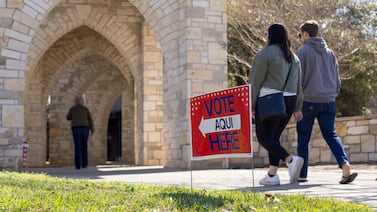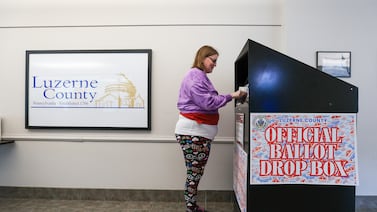Votebeat is a nonprofit news organization reporting on voting access and election administration across the U.S. A version of this post was originally distributed in Votebeat’s free weekly newsletter. Sign up to get future editions, including the latest reporting from Votebeat bureaus and curated news from other publications, delivered to your inbox every Saturday.
The Republican Party has tried, at least nominally, to undo some of the damage former President Donald Trump has done since 2020 to the party’s faith in voting by mail. But it appears Trump — the GOP presidential nominee three times running — doesn’t want to cooperate. In recent months he has called mailed ballots “a disaster” and “totally corrupt.” On Fox News, he said, “If you have mail-in balloting, you automatically have fraud.”
The evidence does not support his statements — something that’s been pointed out ad infinitum — and the Republican Party’s official position is that voters should use any method they can to cast their ballots. “We’ll have early voting in Michigan for the first time. We’ll take advantage of it,” a top Republican National Committee official said on a press call last week, CNN reported. “Mail ballots are not very old in Pennsylvania. We’ll have an opportunity to grow that. Ballot harvesting in Nevada is legal under certain circumstances. We’ll take advantage of it.”
Trump’s campaign appears aware that he is contradicting the party. In an emailed response to the Washington Post about the campaign’s position on vote by mail, a spokesperson sent back the party’s official line. Still, Trump himself continues to discourage GOP voters from casting ballots this way, a choice that has potential repercussions for voting in 2024.
For one thing, lots of people are writing about the challenge this presents for Republicans. In those articles, they’ll remind you of the 2020 U.S. Senate runoff in Georgia, after which Republicans lost control of the chamber. I was there, sitting next to Secretary of State Brad Raffensperger in the Georgia Emergency Management Agency office. Others on his staff had been warning for weeks that Trump’s comments had the potential to suppress the vote.
When the Senate results were called — TVs were mounted on every wall and people were running in and out with updates — Raffensperger didn’t really seem surprised.
“Trump did this,” Raffensperger said to me, dejectedly looking at the television on the far wall.
Nearly four years later, Trump’s claims about mail voting, and elections in general, continue to undermine confidence in elections among his supporters, and the leadership of the Republican Party is clearly worried about a similar outcome (even if many of their candidates haven’t made the same realization). A recent poll from the Secure Elections Project found that roughly two-thirds of Republicans in Georgia, Arizona, and Wisconsin say they believe the 2020 election was stolen from Donald Trump, which is consistent with the national average for Republicans and conservatives.
“I worry as both someone who is concerned about our country but also as a Republican” about Trump’s false claims, Trey Greyson, the co-chair of the advisory board for Secure Elections Project, told me. “After all, why take the time to vote if it’s rigged?”
Greyson points out more practical concerns about setting up voters to be disenfranchised. “What if too many GOP voters were to listen to Trump and ignore voting by mail, if that were an option, and something unexpected — weather, illness, traffic delays, work — were to pop up on Election Day?” he said. “I’m reminded of the potential big snowstorm in the GOP areas of Nevada that was forecast for Election Day in 2022.”
The only real whiff of good news the Secure Elections poll found was that most of the swing state Republicans who responded trust their own elections: They’re happy with the election processes in their states and have confidence in their own election administrators. Most believed their own vote counted.
But, of course, most also still believe the 2020 election was stolen from Trump because they believe the votes of others were stolen, and Trump is continuing to promote that claim.
In a radio interview this month, Trump again falsely claimed he won Wisconsin in 2020. “And after the wrongdoing was found, people said, ‘Well, he actually did win,’” Trump said during a radio interview. Actually, President Joe Biden narrowly won Wisconsin in 2020, and there has been no evidence the results were fraudulent. Nevertheless, it is a sign that Trump plans to continue falsely asserting he won the 2020 election — claims that supercharged his fundraising pitches four years ago.
It remains to be seen how his claims affect voter behavior this time around — or whether it makes a difference that his own party has reasons not to support his assertions this time.
Jessica Huseman is Votebeat’s editorial director and is based in Dallas. Contact Jessica at jhuseman@votebeat.org.






